The Roku Wireless Speakers and subwoofer reviewed here are somewhat niche. You won’t find a lot of the best soundbars on the market that can function as the center of a surround sound system. In fact, you’re lucky if they have the ability to add a subwoofer.
What makes these special is their modularity. You can buy one set of speakers to give a Roku Streambar rear speakers for that surround sound. Or, you can get two pairs to get a more full-range sound up front and behind you, with a pair acting as the main stereo speakers and a pair for the rear speakers. This also means you can use these as an audio solution for Roku TVs. And, of course, you can add a sub to get that low-end that no TV, let alone soundbar, can provide.
But, how well does it work? There are plenty of gadgets that seem like good ideas based on the features or functionality they provide. However, things are not always as good as they look on paper. Luckily, these Roku Wireless speakers do their job well. You won’t confuse them with audiophile equipment but they do what they’re supposed to, and they do it well.
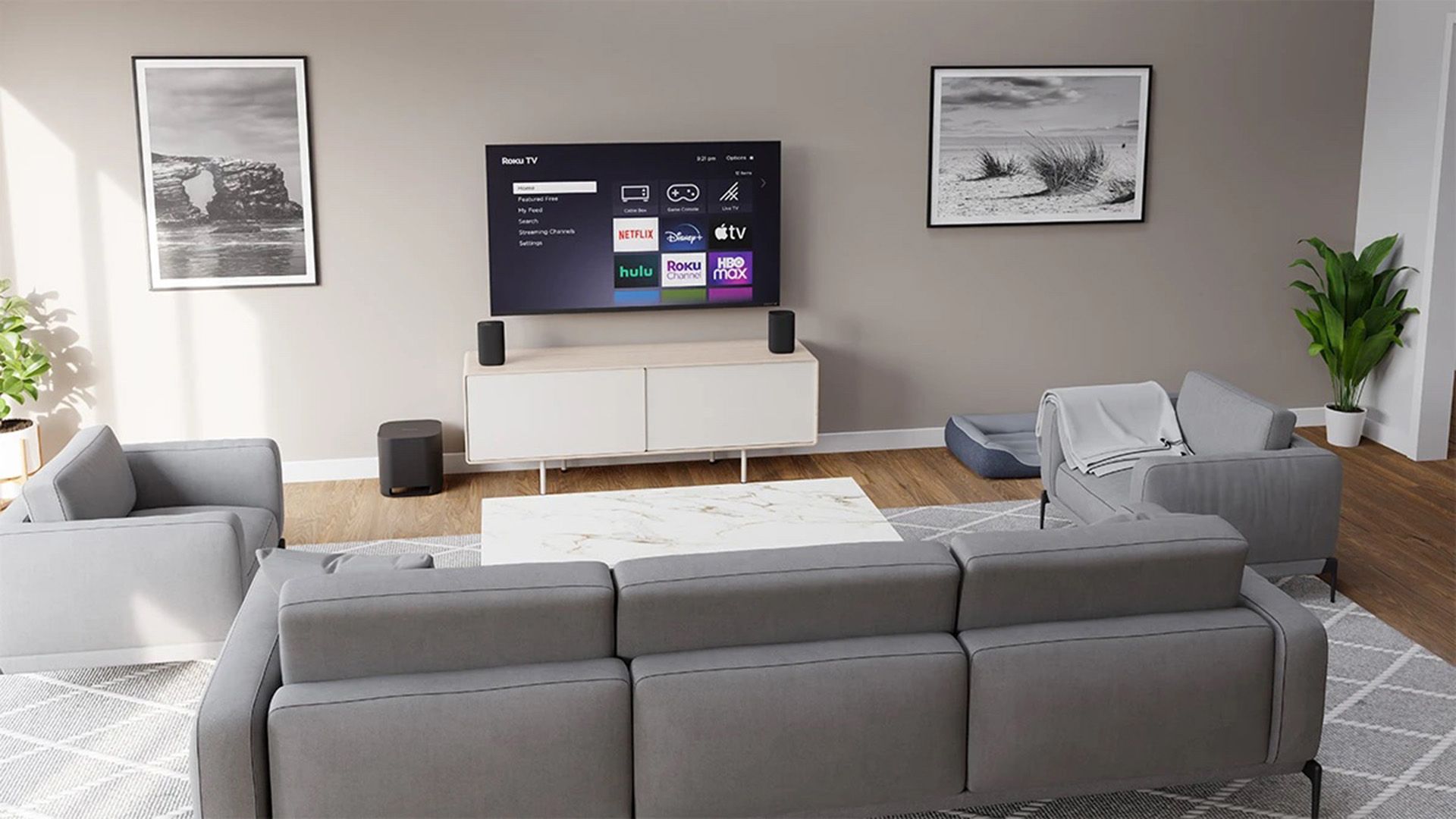
(Image credit: Roku)
Roku Wireless Speakers review: price and release date
Available since the tail end of 2018, the Roku Wireless Speakers and Subwoofer are quite a steal. For $149.99, you get two wireless speakers that can either act as the front stereo speakers of a Roku-equipped soundbar or TV or as the surround speakers. Another $179.99 will net you a fairly powerful subwoofer. (These are only available in the US.)
Considering you can actually pair two sets of speakers and one subwoofer with a Roku device, it will set you back around $480 for a full surround sound system. The only caveat – and this is crucial if you’re considering any of these wireless speakers – is that they are a supplement to only a Roku device and only a Roku soundbar or Roku-equipped TV. You can’t buy these and use them with an Apple TV, a Chromecast, or a smart TV that does not have a Roku interface. You can’t even use them with a standalone Roku streaming player.
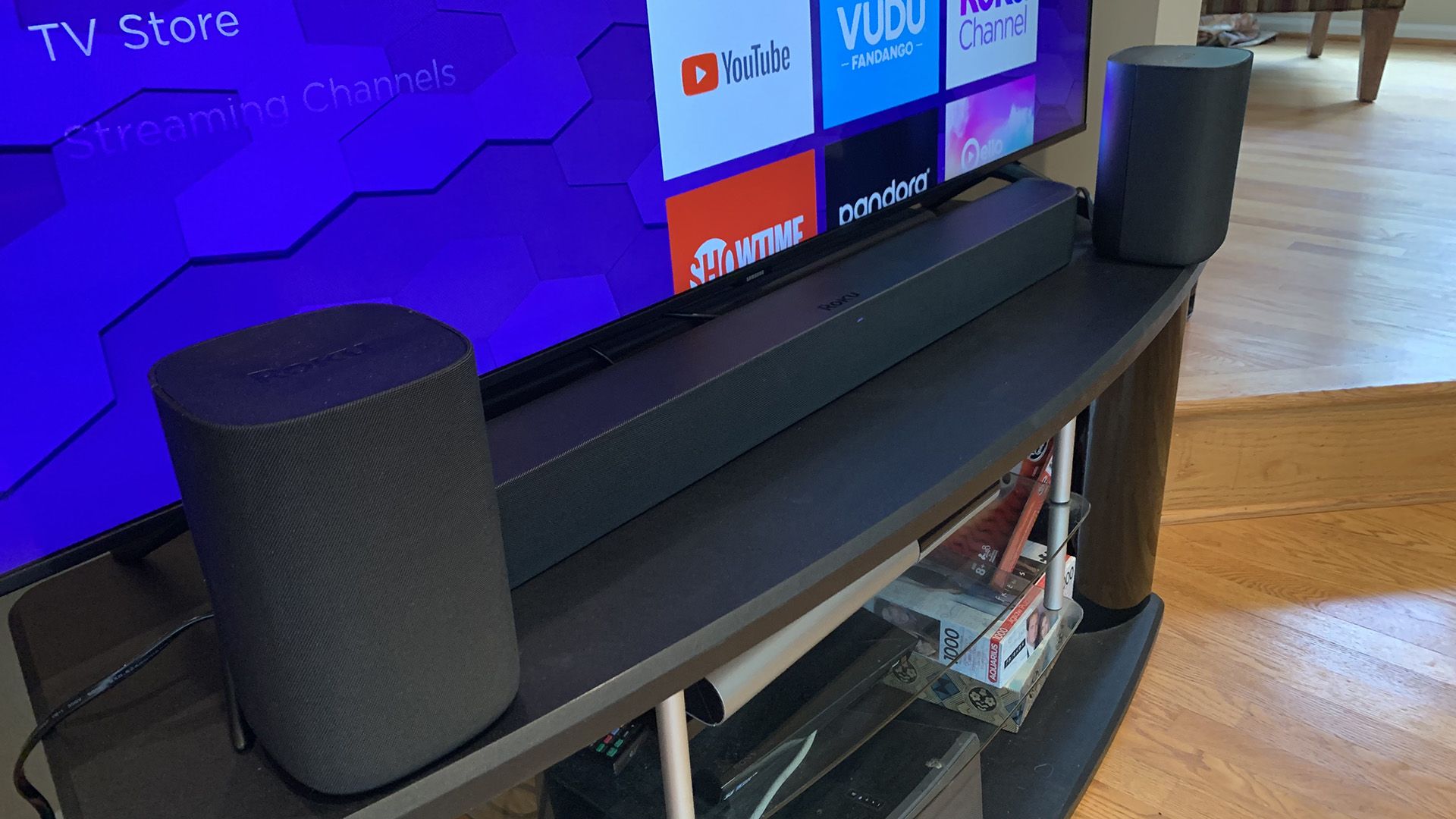
(Image credit: James Holland)
Roku Wireless Speakers review: setup
Setting up the speakers and subwoofer with a Roku device is incredibly easy. With my test configuration, I had two sets of wireless speakers and one subwoofer. I had a Roku Streambar Pro already fully set up. To transform that 2.1 soundbar into a fully fledged surround sound system, I unboxed and placed each speaker and subwoofer around my living room first and then plugged each of them into a wall outlet. In fact, that was probably the hardest part; making sure each had an outlet accessible. After all, they might be wireless in terms of connecting to the TV or soundbar but they still need power.
Once I had them plugged in, the Roku automatically detected them and led me through step-by-step instructions including making sure that it was registering where they were placed in the room. For example, I had a pair flanking my TV and a pair in the back of the room and it asked which pair I was setting up and then would play a sound in one speaker and then the other to make sure it had properly identified which one was the left and which one was the right. All in all, it’s very straightforward. And, the subwoofer was just as easy. If you need to do the setup and don’t get automatically prompted to do so, you can easily get started by going into the settings where you connect new devices.
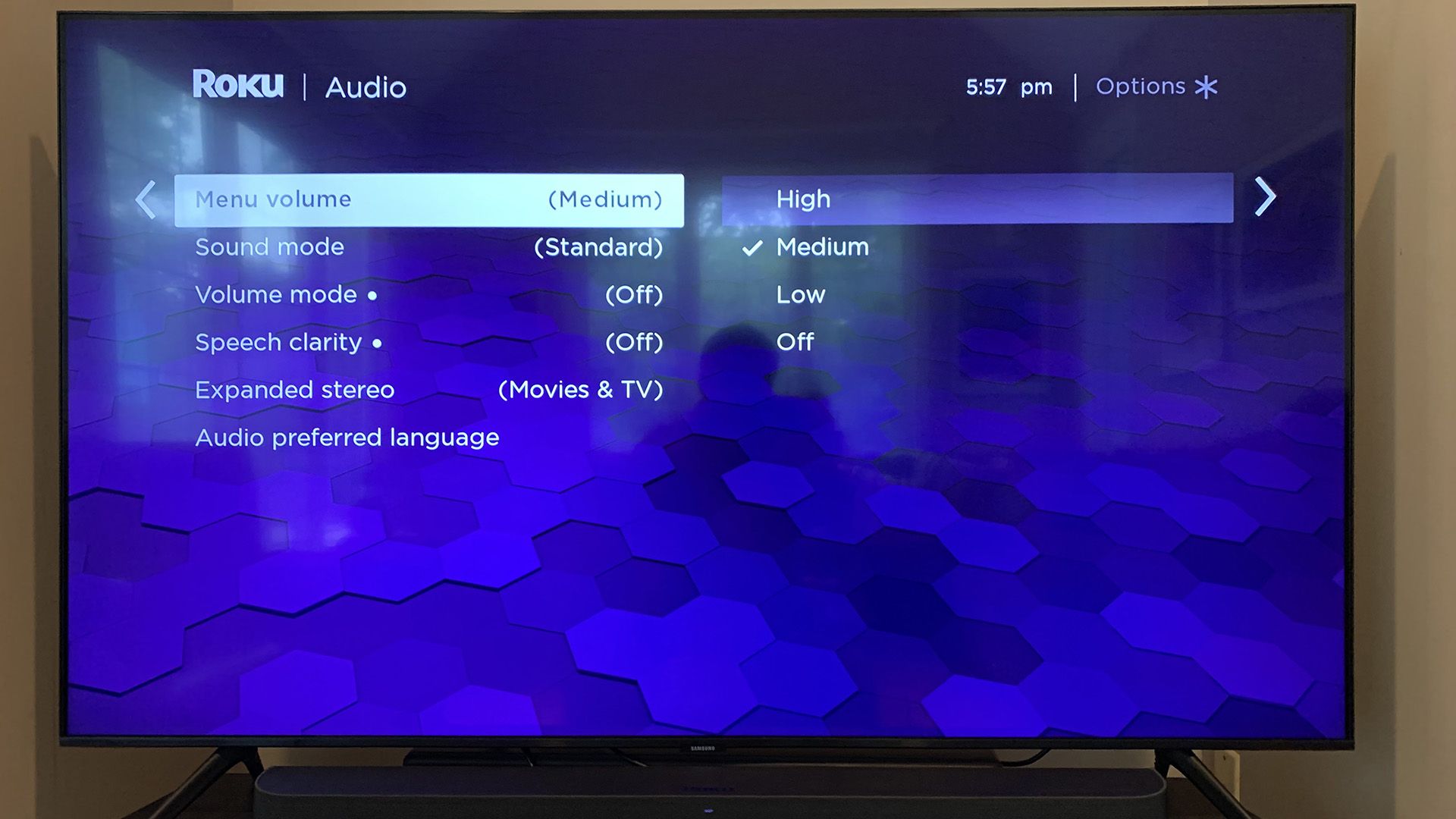
(Image credit: James Holland)
Roku Wireless Speakers review: design
The Roku Wireless Speakers are very sleek and modern looking. They’re in a matte black with a matching grill that covers the front half of the speaker box with the logo engraved, in a shiny black, on the top of the speaker. The subwoofer keeps a similar profile though with no grill as it’s a downward-firing subwoofer in a sealed cabinet. Instead, it has ports at the bottom of each side to allow that low end sound to project.
At 4.9 x 4.9 x 7.7 inches, these speakers are sizable enough to produce a full sound but are still small enough to be discreet. They house a 0.75-inch tweeter to cover the high frequencies and a 3.5-inch woofer for lows and mids. There’s also a quarter-inch mounting socket if you prefer to have them mounted on the wall.
The subwoofer is also medium-sized, measuring 11.8 x 11.8 x 11.8 inches, sporting a 10-inch speaker underneath. Being a subwoofer, it’s a bit less discreet but that’s to be expected with a subwoofer.
When it comes to controls and inputs, the speakers and sub are the very epitome of minimalist. Each one only has one input and that’s for the power cable. Luckily, those are recessed for easy cable management and a cleaner look instead of having cables sticking straight back.
They also come with one LED and a single reset button, both situated on the back so that you know they’re getting power. If you have troubleshooting issues, you either hold down the reset button, unplug, or figure it out in the Roku settings. This is as straightforward and simple as it gets. Of course, it would have been nice for the ability to connect through an analog connection if need be but these are not meant for a size-fits-all situation. These are meant for those who want a wireless speaker setup. They’re also the only way to turn a Roku soundbar into a surround sound system.
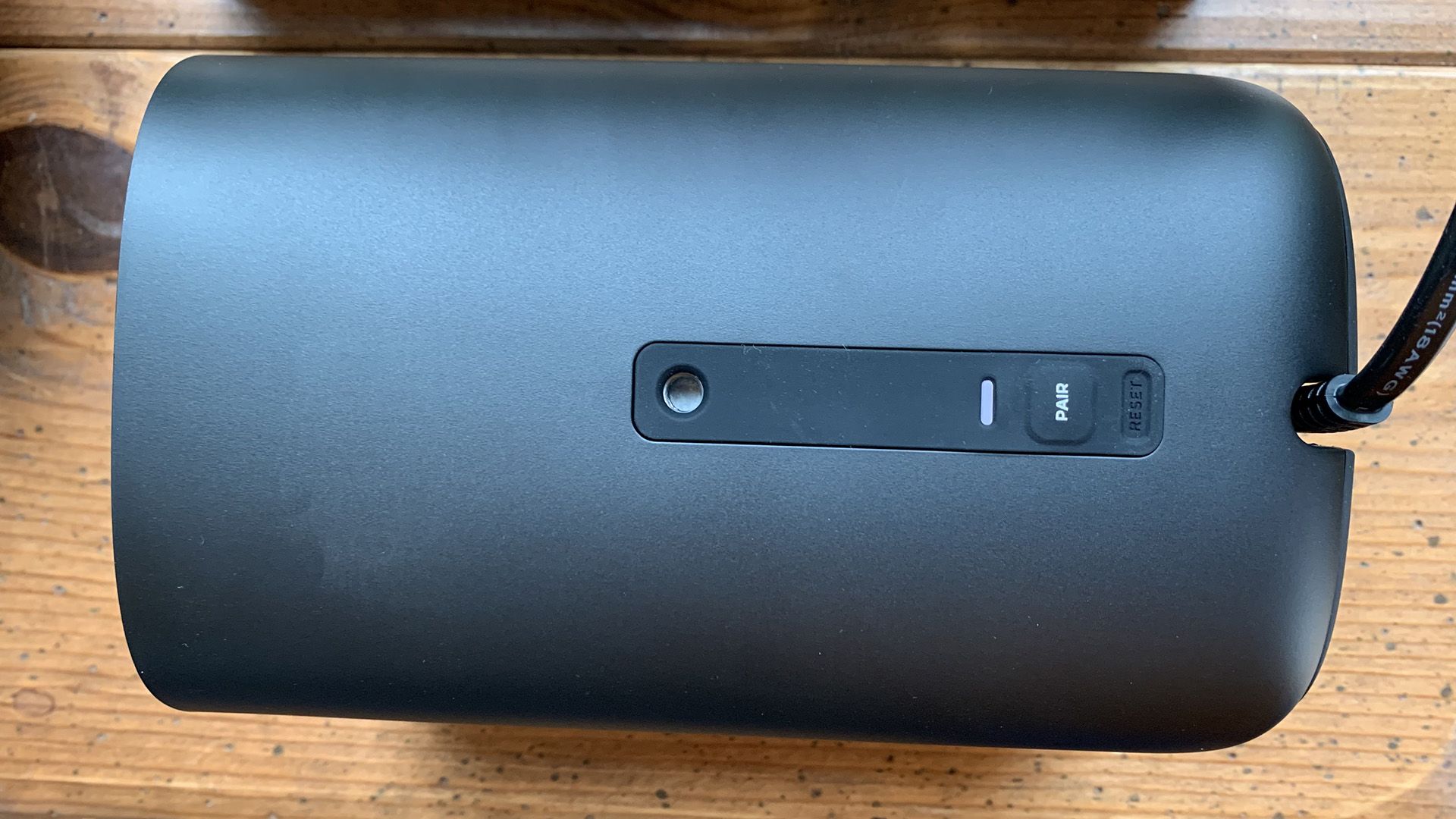
(Image credit: James Holland)
Roku Wireless Speakers review: performance
For this review, I tested four speakers and a subwoofer all connected to the Roku Streambar Pro. Two are situated on either side of the soundbar at the front of the room, responsible for the stereo audio with the soundbar itself providing the center channel. I have two speakers in the back of the room to provide surround sound (you can also change settings to have all the audio come out of all the speakers) as well as a subwoofer placed at the back of the room as well. I tested it with older movies and shows that only came through the front speakers as well as contemporary blockbusters that utilized all the speakers.
Adding these speakers in were not only a massive improvement in sound quality over that of the TV’s but a noticeable if smaller improvement over that of the Streambar Pro’s. I can hear dialogue loud and clear no matter what I’m watching. There’s also more than enough volume for just about any living room set up.
The mids seem to be more pronounced, making sure that the frequency range where voices sit is never lost. The bass is plenty powerful – the subwoofer has 125 watts RMS of power – so you get plenty of low end even when the volume is turned down. And, that’s without adjusting any settings. The highs are fairly crisp, so you won’t miss out on any details but that emphasis in the mids can overpower the highs just a little bit. These are not audiophile level but if you’re looking for good sound and not necessarily amazing sound, these do a great job.
One place where the Roku Streambars tend to fall short is in their soundstage. This is typical of soundbars since a sound stage can only be as wide as the physical placement of the actual speakers. By having actual speakers that can be moved closer together or farther away, you can actually have a much more prominent soundstage with these wireless speakers.
More interestingly, when you add rear speakers, they do a great job of giving that 360 degree experience that surround sound is supposed to offer. Audio elements surprise from behind with all sorts of elemental sounds for an immersion that can hardly be beat. There’s no Dolby Atmos here but I doubt you’ll miss it.
While you can’t physically change any settings on any of the speaker cabinets, you can easily do so in the Roku interface. Pressing the star button on the remote takes you to a section that allows you to boost or cut the Bass, Treble, and Surround settings. I would have also appreciated a mids slider.
You have a number of presets on hand. The Sound Mode in the menu lets you choose presets to cater to different occasions such as when playing a movie or music. There’s also a Volume Mode that will compress the sound to one of two settings so that loud parts aren’t quite so loud, a nice feature if you’re watching when everyone else has gone to bed. There’s also Speech Clarity that gives a few settings that will boost the high mids to make dialogue easier to hear.
While I did test it, this is a feature that I didn’t find necessary due to the speakers’ mid-focus. The last of the settings, Expanded Stereo, lets you choose between hearing audio in surround sound, having all the speakers playing sound in stereo (ideal for listening to music), or to just use the front speakers for a straight stereo signal.
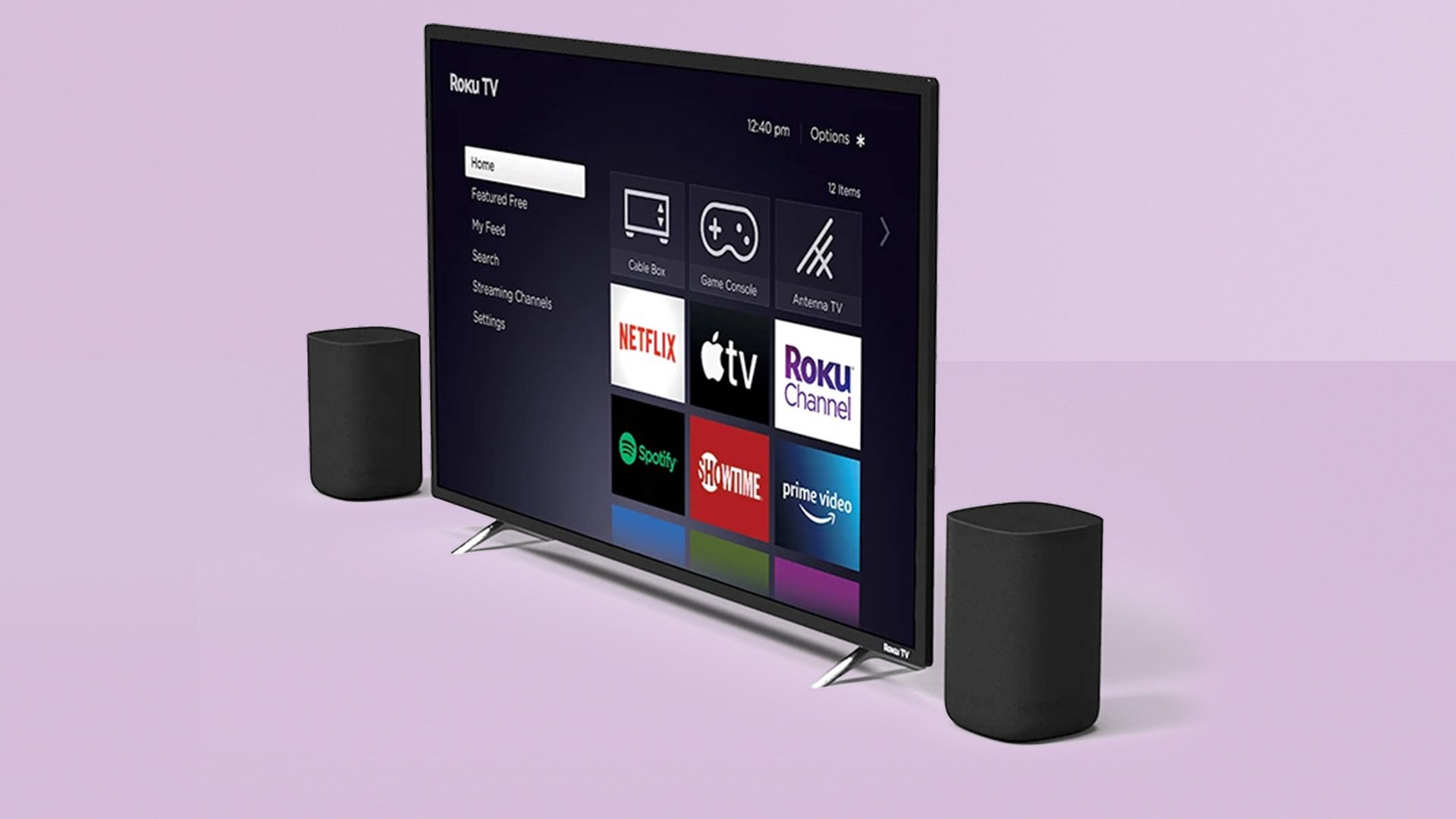
(Image credit: Roku)
Roku Wireless Speakers review: verdict
The Roku Wireless Speakers and Subwoofer are fantastic additions to a Roku soundbar or Roku-equipped TV. While I do wish they could pair with any Roku streaming player, the ones that they do connect with are only improved by their addition. I also appreciate their modularity. You can just get the subwoofer if you want more bass, one pair of speakers if you want a wider soundstage, or the whole set.
They’re easy to set up. It took me maybe 10 minutes to get all four speakers as well as the subwoofer up and running. And, though they’re limited on extra features, their most important being that wireless connectivity works flawlessly, though I did have a strange issue with the subwoofer that resolved itself after a day or so.
Lastly, I was really pleased with their sound quality. Again, they’re not audiophile quality with incredible detail and resolution but they will satisfy most people. More importantly, they are a marked improvement over any TV’s audio performance. Considering the price, these wireless speakers are a great value, no matter which configuration you get.
Roku Wireless Speakers review: also consider
If you don’t want to be locked into a Roku system and want that full surround sound goodness, not to mention Dolby Atmos which is entirely missing from Roku’s audio products, then maybe the SAMSUNG HW-Q950A system is for you. It’s much more powerful as well, making it an ideal companion to a larger home theater setup. That said, it also comes with a much more serious price.
While not quite as robust sonically, the Victrola Premiere V1 makes up for that with its features. Not only can it function as a soundbar thanks to both its optical in and bluetooth connectivity, but it’s also a capable record player. And, for $500, you also get a wireless subwoofer. You won’t have those extra speakers to that wide surround sound but if you’re looking for something compact, feature-filled and functional, consider the Victrola.
It’s not wireless but the Wharfedale DX-2 delivers the kind of sound that most budget surround systems just can’t. Not only is there plenty of volume on tap but the sound quality is clear and engaging. Of course, the Wharfedale is a more traditional approach to home theater audio so you’ll have to live with a wired system and it does cost a little more than our review setup here.
"sound" - Google News
August 21, 2022 at 11:00AM
https://ift.tt/BRXapcW
Roku Wireless Speakers review: a hassle-free sound upgrade - T3
"sound" - Google News
https://ift.tt/wLOojTG
Shoes Man Tutorial
Pos News Update
Meme Update
Korean Entertainment News
Japan News Update

No comments:
Post a Comment